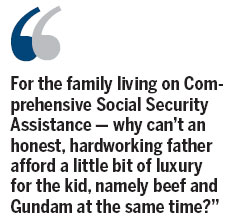Poverty definition: One boy's beef is another boy's Gundam
Updated: 2013-09-07 07:13
By Jony Lam(HK Edition)
|
|||||||||
If one man's meat is another one's poison, a poor kid's beef is another poor kid's Gundam. This truism revealed itself in a recent episode of TVB Jade's reality show News at 6:30, where a family is featured to illustrate how the working poor live. But the viewers were enraged when they found out the poor kid dared dream of beef while possessing a Gundam (Japanese anime giant robots) toy model.
It turns out although the government has a census department that collects income statistics, it does not know how to interpret them. To save the government from embarrassment, the Hong Kong Council of Social Service (HKCSS) downloaded the data, ran them with an advanced statistical device known as the "median", and did the analysis. It found that those with incomes of less than half the median wage increased last year to more than 1.16 million, up 10,000 from that of 2011. The Council suggested a brand new label for this shocking discovery - the poor.
We would never have known that the poor exist but for the HKCSS. Rumor has it the council sponsored a talented young scholar in Germany for 10 years to learn the "median", according to which in 2012 a one-person household is poor if it earns less than HK$3,750 a month. The poverty lines for families with two people, three people, and four people or above are HK$8,000, HK$11,750, and HK$14,650, respectively.
An even more amazing achievement for the HKCSS is the discovery that jobs make people poor, which is evident from the fact that 644,000 among the 1.16 million poor people live in a household with at least one working member. We used to think that the poor are lazy, and that having more income-earning members tend to make a household less poor. Apparently these are misconceptions.
The poverty trap is best avoided by surgical sterilization, according to the HKCSS. The child dependency ratio in working poor families is 275, which means that for every thousand adults in their working age (15-65 years old), there are 275 children (0-14 years old). The average child dependency ratio in Hong Kong is much lower at 160, which means that the ratio is even lower if only non-poor households are considered.

As having a job and reproducing for the species' survival are detrimental to a family's financial well-being, the HKCSS advocates subsidizing these socially useful activities with 10 percent of the respective median income levels. Under this proposal, a two-member family earning below HK$8,000 a month would receive HK$1,600 (10 percent of the median income level of HK$16,000 for such families).
To make us sympathetic to the scheme, TVB presented us with a family with two parents and a kid. The father, a truck driver, supports the family with a monthly wage of HK$12,000. The family pays HK$3,500 a month for a crappy 100-square-feet subdivided room. The mother, whose accent suggests she has recently arrived from the Chinese mainland, was seen telling us that she could use some extra cash to buy beef.
The viewers almost cried, but some mean-spirited people were quick to spot boxes of a Gundam model in a crowded corner of the room. Some claimed that one of these toys costs HK$600, which if sold, could buy a lot of beef. Screenshots of the poor mother kneeling in front of the Gundam boxes soon circulated on Facebook like crazy, drawing widespread discussion.
The whole Gundam versus beef debate is a distraction from the real issues, such as whether or not the poverty line is properly drawn, whether rents in Hong Kong are too high, or whether a subsidy is an effective solution for poverty reduction. For the family living on Comprehensive Social Security Assistance - why can't an honest, hardworking father afford a little bit of luxury for the kid, namely beef and Gundam at the same time?
If Gundam-owning kids are not entitled to demand beef, I don't see why we should be satisfied with the limited democracy that we now have.
The author is a current affairs commentator.
(HK Edition 09/07/2013 page6)